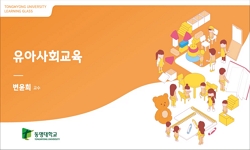The purpose of this study was to investigate the influence of parents’ child attachment and parents’ emotional intelligence on children’s prosocial behavior according to children’s temperament. The subjects of this study were 580 parents who h...
http://chineseinput.net/에서 pinyin(병음)방식으로 중국어를 변환할 수 있습니다.
변환된 중국어를 복사하여 사용하시면 됩니다.
- 中文 을 입력하시려면 zhongwen을 입력하시고 space를누르시면됩니다.
- 北京 을 입력하시려면 beijing을 입력하시고 space를 누르시면 됩니다.

부모의 자녀 애착과 정서지능이 유아의 친사회적 행동에미치는 영향: 유아 기질에 따른 차이분석 = The Influence of Parents` Child Attachment and Parents` Emotional Intelligence on Children`s Prosocial Behavior: An Analysis of the Differences by Children`s Temperament
한글로보기https://www.riss.kr/link?id=A101759923
- 저자
- 발행기관
- 학술지명
- 권호사항
-
발행연도
2016
-
작성언어
-
-
주제어
유아 ; 친사회적 행동 ; 기질 ; 자녀애착 ; 정서지능 ; Children ; Prosocial Behavior ; Temperament ; Parents` Child Attachment ; Emotional Intelligence
-
KDC
300
-
등재정보
KCI등재
-
자료형태
학술저널
- 발행기관 URL
-
수록면
127-154(28쪽)
-
KCI 피인용횟수
9
- 제공처
-
0
상세조회 -
0
다운로드
부가정보
다국어 초록 (Multilingual Abstract)
The purpose of this study was to investigate the influence of parents’ child attachment and parents’ emotional intelligence on children’s prosocial behavior according to children’s temperament. The subjects of this study were 580 parents who have 4year-6year children in Dae-gu and Kyung-buk. The research questionnaire was composed of several scales such as Modified Prosocial Behavior Questionnaire adapted by hong(2008), Modified Parent Temperament Questionnaire for Children 3-7 years of age(PTQC) adapted by Kim(2001), Modified Parents’ Child Attachment Measure which was revised by Kim(2008), and The Adult Emotional Quatient Test(AEQT) which was revised by Moon(1999). Major results of this study were as follows. First, the parents’ child attachment and the parents’ emotional intelligence showed positive correlations into children’s prosocial behavior in easy temperament children group, difficult temperament children group. Second, there were differences from parent’ child attachment and children’s prosocial behavior on children’s temperament. Third, parents’ child attachment influenced upon children’s prosocial behavior in easy temperament children group and difficult temperament children group. The result of each sub factors was different. Fourth, parents’ emotional intelligence influenced upon children’s prosocial behavior in easy temperament children group and difficult temperament children group. Also, easy temperament children group got a higher grade than difficult temperament children group. The result of each sub factors was different.
참고문헌 (Reference)
1 문용린, "한국에서의 정서지능 측정연구" 세종문화사 1996
2 곽금주, "학교폭력 및 왕따 예방프로그램(I) : 개관" 5 (5): 105-122, 1999
3 권민균, "친사회적 동화를 활용한 소그룹 토의 활동이 유아의 친사회적 행동에 미치는 효과" 미래유아교육학회 11 (11): 359-378, 2004
4 박진영, "초등학교 5, 6학년생의인터넷 중독과 부모-자녀 애착" 12 (12): 25-36, 2009
5 문은식, "청소년의 애착안정성과 학교생활 적응행동의 관계" 한국교육학회 41 (41): 349-369, 2003
6 박정녀, "청소년의 부모 애착과 자동적 사고 및 공격성" 한국상담심리학회 17 (17): 249-264, 2005
7 박서영, "청소년의 도덕적 정서와 문화성향에 따른 지인 및 타인에 대한 친사회적 행동에 관한 연구" 한국심리학회 산하 한국발달심리학회 25 (25): 85-106, 2012
8 박언하, "자살 관련 미디어 노출 빈도에 따른 유아의 죽음 불안의 차이 연구" 미래유아교육학회 17 (17): 387-403, 2010
9 김은경, "자녀의 정서표현에 대한 부모의 태도, 남녀 아동의 정서조절 능력 및 사회적 능력간의 관계" 한국아동학회 28 (28): 115-131, 2007
10 서소정, "유아의 친사회적행동에 관한 연구: 유아의 요구전략, 언어발달, 어머니의 친사회성에 관련된 양육신념 및 사회화전략을 중심으로" 한국열린유아교육학회 11 (11): 287-310, 2006
1 문용린, "한국에서의 정서지능 측정연구" 세종문화사 1996
2 곽금주, "학교폭력 및 왕따 예방프로그램(I) : 개관" 5 (5): 105-122, 1999
3 권민균, "친사회적 동화를 활용한 소그룹 토의 활동이 유아의 친사회적 행동에 미치는 효과" 미래유아교육학회 11 (11): 359-378, 2004
4 박진영, "초등학교 5, 6학년생의인터넷 중독과 부모-자녀 애착" 12 (12): 25-36, 2009
5 문은식, "청소년의 애착안정성과 학교생활 적응행동의 관계" 한국교육학회 41 (41): 349-369, 2003
6 박정녀, "청소년의 부모 애착과 자동적 사고 및 공격성" 한국상담심리학회 17 (17): 249-264, 2005
7 박서영, "청소년의 도덕적 정서와 문화성향에 따른 지인 및 타인에 대한 친사회적 행동에 관한 연구" 한국심리학회 산하 한국발달심리학회 25 (25): 85-106, 2012
8 박언하, "자살 관련 미디어 노출 빈도에 따른 유아의 죽음 불안의 차이 연구" 미래유아교육학회 17 (17): 387-403, 2010
9 김은경, "자녀의 정서표현에 대한 부모의 태도, 남녀 아동의 정서조절 능력 및 사회적 능력간의 관계" 한국아동학회 28 (28): 115-131, 2007
10 서소정, "유아의 친사회적행동에 관한 연구: 유아의 요구전략, 언어발달, 어머니의 친사회성에 관련된 양육신념 및 사회화전략을 중심으로" 한국열린유아교육학회 11 (11): 287-310, 2006
11 지성애, "유아의 정서지능과 인지능력, 또래상호작용, 유아-교사관계 간의 관계 분석" 한국영유아교원교육학회 15 (15): 335-358, 2011
12 이은희, "유아의 성, 출생순위, 또래지위와 기질의 관계" 서원대학교 교육대학원 2000
13 조혜진, "유아의 사회·정서발달에 미치는 가족특성, 보육경험 및 기질 변인 분석" 이화여자대학교 대학원 2004
14 강문희, "유아의 부정적 정서에 대한 부모의 반응유형, 유아의 대처반응 및 또래수용간의 관계 연구" 20 (20): 171-182, 1999
15 이양희, "유아의 반사회적 행동 중재를 위한 사회기술훈련 프로그램의 개발" 미래유아교육학회 11 (11): 251-276, 2004
16 홍혜란, "유아의 기질, 정서능력, 친사회적 행동발달 및 어머니의 친사회성과 관련된 양육신념과의 관련성에 관한 연구" 경희대학교 교육대학원 2008
17 공영숙, "유아의 기질, 어머니 양육태도, 유아의 정의적 실행기능, 문제행동 및 친사회적 행동 간의 관계" 한국아동교육학회 21 (21): 135-152, 2012
18 김성민, "유아의 기질, 성 및 형제 유무에 따른 놀이행동 연구" 서원대학교 교육대학원 2001
19 안라리, "유아의 개인변인 및 어머니의 정서성과 유아의 정서 발달, 사회적 능력의 관계" 이화여자대학교 대학원 2005
20 김성애, "유아에 대한 양육자의 애착, 유아의 정서조절 능력 및 공격성간의 관계 : 시설유아와 일반유아의 비교" 이화여자대학교 대학원 2008
21 장선철, "유아사회교육" 태영출판사 2007
22 최지영, "유아기질과 부모양육태도가 유아의 공격성에 미치는 영향" 미래유아교육학회 17 (17): 119-137, 2010
23 전효정, "유아기 부모와의 애착경험이 성인기 애착유형과배우자 선택에 미치는 영향" 5 : 21-34, 1999
24 남궁령, "유아 친사회성에 영향을 미치는 어머니 정서표현성, 어머니 의사소통, 유아 자아탄력성 간의 구조모형분석" 한국유아교육학회 34 (34): 127-146, 2014
25 고현, "유아 정서지능·유치원 적응·유아행복감 간의 관계" 미래유아교육학회 21 (21): 115-136, 2014
26 서영민, "외동아의 친사회적 행동과 다중지능, 부모의 양육태도와의 관계" 한국열린유아교육학회 14 (14): 349-369, 2009
27 이영, "영유아발달" 학지사 2009
28 육아정책연구소, "영유아기 따돌림 실태조사 결과" 2014
29 조영아, "영아의 기질 및 영아-교사간 애착안정성에 따른 또래간 상호작용 차이" 대구가톨릭대학교 교육대학원 2008
30 황현주, "영아에 대한 어머니의 애착측정도구 개발과 타당화 연구" 고려대학교 대학원 2006
31 김혜순, "어머니의 집착과 양육 효능감 및 유아의 정서지능 간의 관계" 미래유아교육학회 16 (16): 203-226, 2009
32 고혜미, "어머니의 영아에 대한 애착, 어머니의 양육스트레스, 영아의 기질 및 어머니-영아 상호작용과의 관계" 경희대학교 대학원 2014
33 조부월, "어머니의 양육효능감 및 언어통제 유형과 유아의 정서지능과의 관계" 미래유아교육학회 19 (19): 133-157, 2012
34 김혜순, "어머니의 양육행동빈도와 자녀성숙행동기대가 유아기 자녀의 친사회적 행동에 미치는 영향" 한국영유아보육학회 (64) : 155-177, 2010
35 이선경, "어머니의 애정적, 거부적 양육태도 및 유아의 정서지능과 사회적 능력 간의 구조모형 분석" 한국유아교육ㆍ보육복지학회 18 (18): 89-113, 2014
36 박성혜, "어머니의 부모역할만족도와 유아의 친사회적 행동과의 관계" 한국영유아보육학회 (57) : 1-21, 2009
37 박연경, "어머니의 리더십이 유아의 자기조절력과 사회적 능력에 미치는 영향" 한국영유아교원교육학회 13 (13): 277-298, 2009
38 박영애, "아동이 지각한 어머니 양육행동과 아동의 정서지능의 관계" 5 (5): 161-182, 2000
39 신진영, "신체접촉 중심 집단놀이 프로그램이 사회적 위축 유아의 또래상호작용에 미치는 효과" 대구대학교 재활과학대학원 2013
40 손윤경, "신체접촉 놀이 활동이 유아의 대인문제 해결력과 사회적 효능감에 미치는 영향" 원광대학교 대학원 2008
41 김준호, "부모의 통제유형과 자녀의 반사회적 행동과의 관계" 16 (16): 49-63, 1995
42 도현심, "부모에 대한 애착 및 또래경험과 초기 청소년의 외로움간의 관계" 20 (20): 33-49, 1999
43 보건복지부, "보육통계(국가승인통계 제15407호, 어린이집 및 이용자통계)"
44 안유리, "만 5세 남아의 반사회적 행동과 만 4세 남아의 반응에 관한 문화기술적 연구" 이화여자대학교 대학원 2010
45 이은화, "Vygotsky의 사회문화적 관점에서 본 유아의 사회극놀이와 발달" 교육과학연구소 27 (27): 5-28, 1998
46 Waters, E., "The stability of attachment security from infancy to adolescence and early adulthood : General introduction" 71 (71): 678-683, 2000
47 Harlow, H. F., "The nature of love" 13 (13): 673-, 1958
48 Ciarrochi, J., "The link between emotional competence and well-being : a longitudinal study" 34 (34): 231-243, 2006
49 Thomas, A., "Temperament and development" runner/Mazel 1977
50 Trommsdorff, G., "Sympathy, distress, and prosocial behavior of preschool children in four cultures" 31 (31): 284-293, 2007
51 Adler, A., "Superiority and social interest: A collection of later writings" Northwestern University Press 1970
52 Muris, P., "Self-reported attachment style, attachment quality, and symptoms of anxiety and depression in young adolescents" 30 (30): 809-818, 2001
53 Graham, C. A., "School-aged children's vulnerability to depressive symptomatology : The role of attachment security, maternal depressive symptomatology, and economic risk" 12 (12): 201-213, 2000
54 성태제, "SPSS. AMOS를 이용한 알기 쉬운 통계분석" 학지사 2007
55 Hartup, W. W., "Relationships as developmental contexts" Erlbaum 1991
56 Eisenberg, N., "Prosocial development. Handbook of child psychology" Wiley 1998
57 Mayer, J. D., "Perceiving affective content in ambiguous visual stimuli : A component of emotional intelligence" 54 : 772-781, 1990
58 Eisenberg, N., "Parents' reactions to children's negative emotions : Relations to children's social competence and comforting behavior" 67 (67): 2227-2247, 1996
59 Holton, R., "Parental cognitive antecedents of child prosocial behaviors" University of Nebraska 2009
60 Ammaniti, M., "Internal working models of attachment during late childhood and early adolescence : An exploration of stability and change" 2 (2): 328-346, 2000
61 Charbonneau, D., "Emotional intelligence and prosocial behaviors in adolescents" 90 (90): 361-370, 2002
62 Baumrind, D., "Current patterns of parental authority" 491 (491): 1-13, 1971
63 Warren, S. L., "Child and adolescent anxiety disorders and early attachment" 36 : 637-644, 1997
64 Pinzi, R., "Attachment styles and aggression in physically abused and neglected children" 30 : 769-786, 2001
65 Torquati, J. C., "Attachment as an organizational construct for affect, appraisals, and coping of late adolescent females" 28 (28): 545-562, 1999
66 Bowlby, J., "Attachment and loss : retrospect and prospect" 52 (52): 664-, 1982
67 McClellan, D., "Assessing the Social Development of Young Children" 1992
동일학술지(권/호) 다른 논문
-
콜라주 활동을 통한 예비유아교사의 바람직한 교직관 형성 지원 프로그램 개발 연구
- 미래유아교육학회
- 유수경 ( Soo Kyoung Yoo )
- 2016
- KCI등재
-
현장 유아음악수업 참여관찰을 통한 예비유아교사의 유아음악교육에 대한 인식 변화
- 미래유아교육학회
- 설장미 ( Jang Mi Seol )
- 2016
- KCI등재
-
가치명료화 교수모형에 따른 유아인성교육 프로그램 적용 효과 연구
- 미래유아교육학회
- 최민수 ( Min Soo Choi )
- 2016
- KCI등재
-
교사변인을 중심으로 한 자연친화 유아교육의 연구 동향: 국내 학술지 연구 분석
- 미래유아교육학회
- 강민희 ( Min Hee Kang )
- 2016
- KCI등재
분석정보
인용정보 인용지수 설명보기
학술지 이력
| 연월일 | 이력구분 | 이력상세 | 등재구분 |
|---|---|---|---|
| 2026 | 평가예정 | 재인증평가 신청대상 (재인증) | |
| 2020-04-14 | 학회명변경 | 영문명 : 미등록 -> Association for Future Early Childhood Education |  |
| 2020-01-01 | 평가 | 등재학술지 유지 (재인증) |  |
| 2017-01-01 | 평가 | 등재학술지 유지 (계속평가) |  |
| 2013-01-01 | 평가 | 등재학술지 유지 (등재유지) |  |
| 2010-01-01 | 평가 | 등재학술지 유지 (등재유지) |  |
| 2008-01-01 | 평가 | 등재학술지 유지 (등재유지) |  |
| 2005-01-01 | 평가 | 등재학술지 선정 (등재후보2차) |  |
| 2004-01-01 | 평가 | 등재후보 1차 PASS (등재후보1차) |  |
| 2002-01-01 | 평가 | 등재후보학술지 선정 (신규평가) |  |
학술지 인용정보
| 기준연도 | WOS-KCI 통합IF(2년) | KCIF(2년) | KCIF(3년) |
|---|---|---|---|
| 2016 | 2.26 | 2.26 | 2.22 |
| KCIF(4년) | KCIF(5년) | 중심성지수(3년) | 즉시성지수 |
| 2.16 | 2.22 | 2.445 | 0.45 |




 KISS
KISS






